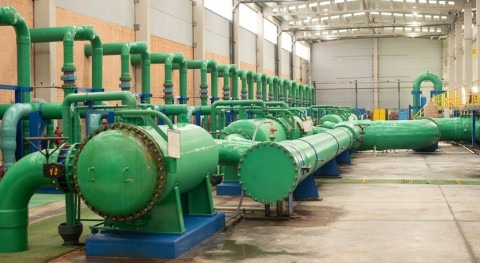Artificial intelligence has the potential to minimize wastewater and optimize systems to support resource recycling, according to experts speaking at the World Economic Forum in Davos, reports Arab News.
Christophe Beck, Chairman and CEO of Ecolab, highlighted the growing recognition among nations of water's critical role in chip production, which feeds into the AI supply chain. In turn, AI can be leveraged to reduce wastewater.
The United Nations projects that by 2030, over half of the global population will experience water stress, affecting economics, health, and food security implications while posing a threat to $1.6 trillion in assets.
“We need to redesign our processes being data centers, mill production, or processors in ways that the water never leaves the site. That’s what we do in data centers related to chip cooling where water never leaves the data centers, unlike the old technologies,” Beck said.
Beck advocated for legislations to promote the adoption of technologies that enable water reuse, leading to energy conservation. “Up to 75 percent of the energy used by power plants is used to manage, heat, cool, transport and treat water. When we reuse and recycle the water, we save energy and money, as well as reduce carbon footprint,” he stated.
The Water Resilience Coalition aims to get 150 companies responsible for a third of global water consumption to commit to three key objectives: reducing water use through energy conservation and leveraging technology, addressing the world's 100 most critical water basins that serve 3 billion people, and ensuring water access for 300 million individuals.
“It is business driven, and it is capital that’s invested at a return, creating a business model that is ultimately much more sustainable and provides water for people in need,” Beck added.
Fabrizio Palermo, CEO and General Manager of Acea, stressed the importance of investing in water resilience, given its critical role in agriculture, industry, energy production, and AI development. He emphasized the need to build an ecosystem that safeguards water sources, effectively captures rainwater, and ensures basin maintenance.
“AI can also help in the transportation of water because it’s a question of managing data. This infrastructure in Europe has been designed more than 56 years ago where the landscape in terms of technology was completely different and no one is in a situation to do predictive maintenance on this infrastructure,” Palermo explained.
He further advocated for achieving net-zero water waste to reduce unnecessary government expenditures related to health.
“It is very important that the water is reused and not sent to the rivers and then to the sea because water is linked with water. Government spending on health is related to water because the consequences of not having proper fresh water are evident nowadays,” Palermo said.
In addition, Fajer Mushtaq, Co-Founder and CEO of Oxyle, raised concerns about the impact of synthetic chemicals, particularly PFAS compounds, on water contamination across Europe. She urged for regulations and corporate accountability to address water treatment and the monitoring of discharged substances.
“I think it’s a systematic problem. The biggest barrier is to enable a proper treatment of water, which is not just going to be from a PFAS perspective, but our system that makes micropollutants,” Mushtaq stated.
Technology needs to be directed at creating a new ecosystem, guided by clear regulations, to ensure safe water is provided for communities, Mushtaq said.

















